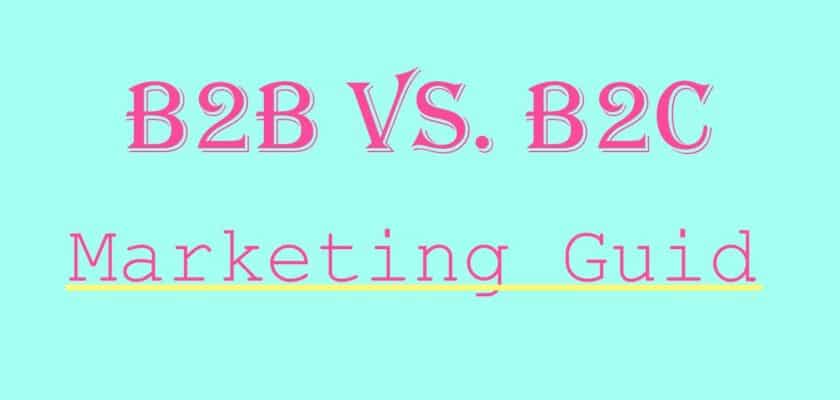In the realm of modern business, marketing strategies are tailored to address the diverse needs and behaviors of different types of customers. Two fundamental approaches, Business-to-Business (B2B) and Business-to-Consumer (B2C) marketing, play pivotal roles in shaping the success of companies across industries. While both share common principles, they exhibit distinct characteristics that warrant separate strategies for effective engagement. In this article, we delve into the core disparities between B2B and B2C marketing, shedding light on how each approach can be optimized to achieve unparalleled results.
Target Audience and Decision-Making Process:
B2B Marketing:
In the B2B landscape, the target audience is predominantly composed of businesses, corporations, and institutions. These entities often require products or services that facilitate their operations, enhance efficiency, or contribute to their value chain. The decision-making process in B2B marketing is intricate and typically involves multiple stakeholders. Purchase decisions are usually based on a careful evaluation of the potential impact on the company’s bottom line, return on investment, and alignment with long-term goals.
B2C Marketing:
B2C marketing, on the other hand, caters directly to individual consumers. The focus here revolves around satisfying personal needs, desires, and aspirations. The decision-making process is comparatively shorter and is influenced by emotions, personal preferences, and instant gratification. B2C marketing often leverages storytelling, brand identity, and emotional connection to create compelling narratives that resonate with consumers on a personal level.
Content and Messaging:
B2B Marketing:
Content in B2B marketing is typically educational, informative, and solution-oriented. Businesses seek in-depth information about how a product or service can address their pain points or offer a competitive advantage. Whitepapers, case studies, and industry reports play a pivotal role in establishing credibility and showcasing expertise. The messaging is grounded in demonstrating the value proposition, ROI potential, and long-term benefits.
B2C Marketing:
B2C marketing emphasizes engaging and captivating content that triggers emotions and prompts immediate action. Consumers are drawn to relatable stories, visually appealing imagery, and messages that align with their personal identities. The content is often shorter, more visual, and tailored to resonate with specific demographics. B2C marketing thrives on creating a sense of urgency, FOMO (fear of missing out), and the promise of enriching the consumer’s lifestyle.
Channels and Engagement:
B2B Marketing:
B2B marketing efforts are commonly executed through industry-specific channels such as trade shows, conferences, and professional networking events. Digital platforms like LinkedIn hold significant value due to their focus on professional connections. Relationship-building and establishing trust through consistent communication are pivotal in B2B engagement.
B2C Marketing:
B2C marketing capitalizes on a broader range of channels including social media platforms, influencer collaborations, and e-commerce websites. The emphasis is on widespread visibility, shareability, and the potential to go viral. Brands strive to create a strong social media presence and engage directly with consumers through comments, shares, and direct messaging.
Metrics and Measurement:
B2B Marketing: Measuring the effectiveness of B2B marketing often involves intricate metrics such as lead quality, conversion rates, and customer lifetime value. The focus is on the long-term relationship and the potential for repeat business. Tracking engagement at various stages of the sales funnel, from initial awareness to final contract signing, provides insights into where adjustments are needed.
B2C Marketing: B2C marketing leans heavily on metrics like click-through rates, conversion rates, and immediate sales impact. The ability to analyze consumer behavior in real-time enables quick adjustments to campaigns. With a shorter sales cycle, the emphasis is on rapid responses and adapting strategies based on immediate feedback.
Personalization and Scalability:
B2B Marketing: Personalization in B2B marketing often involves tailoring solutions to meet specific business needs. Customized proposals and consultations showcase a deep understanding of the client’s industry and challenges. However, personalization can be resource-intensive, making scalability a challenge as businesses work to balance individual attention with broader outreach.
B2C Marketing: B2C marketing thrives on personalization at scale. With a larger audience base, the challenge lies in segmenting consumers effectively and delivering personalized content and recommendations. Utilizing data-driven insights, brands can create personalized experiences that resonate with consumers’ preferences and buying history, enhancing loyalty and repeat purchases.
Building Brand Authority:
B2B Marketing: B2B marketing success hinges on establishing the brand as an industry authority. Demonstrating expertise through thought leadership pieces, industry analysis, and participation in relevant forums solidifies the brand’s position. Collaborations with other industry leaders and endorsements further enhance credibility.
B2C Marketing: In B2C marketing, the focus is on building a brand that elicits trust and emotional connection. Consistent messaging, visual identity, and delivering on promises are critical. Brands often utilize storytelling to create a strong brand persona that resonates with consumers’ values and aspirations.
Customer Relationship Management:
B2B Marketing: B2B relationships are characterized by ongoing interactions, even after the sale. Customer relationship management involves maintaining open communication, providing post-sale support, and identifying opportunities for upselling or cross-selling based on evolving business needs.
B2C Marketing: B2C relationships extend beyond the sale through engagement and retention strategies. Loyalty programs, personalized offers, and customer support contribute to nurturing a long-term relationship. Brands tap into emotions to create a sense of belonging and loyalty, encouraging repeat purchases and referrals
Conclusion of B2B and B2C
While B2B and B2C marketing differ in their core approaches, both are driven by the fundamental need to understand and cater to their respective audiences. The key to success lies in crafting strategies that resonate with the unique behaviors, motivations, and decision-making processes of businesses and consumers. By embracing the nuances of each approach, businesses can tailor their marketing efforts to achieve maximum impact and foster lasting relationships in their target markets.
